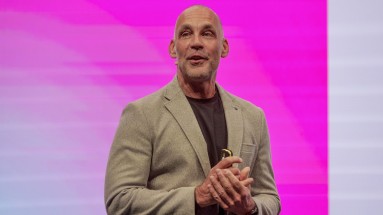Page content
How to manage the uncertain

Trend researcher Richard van Hooijdonk
Incidentally, the futurologist himself has no problem with change: he had his first chip implanted in his hand seven years ago, and others have followed. Next, he wants a brain chip, because he is convinced that such implants will cure epilepsy or dementia in the future.
What still sounds utopian today can very quickly become reality. When Jen-Hsun Huang, CEO of chipmaker Nvidia, said in January that quantum computing would not be available for another 20 years, he immediately met with opposition, as Hooijdonk explained in his keynote speech: First, Google said it would only take a few years, then Microsoft came along with the message: We already have it. In view of the pace at which artificial intelligence is developing, management is now only about one thing, according to Hooijdonk: ‘We need money to manage the unknown’. Those who don't understand this will quickly be out of the market. Just like the former US video rental chain Blockbuster, with its 2000 stores, whose management believed until the very end that Netflix would not be successful because streaming did not work.
Re-design for companies
Hooijdonk announced that AI will take over more and more jobs, including in the knowledge and creative sectors: around 20 to 30 per cent of today's jobs will be done by machines in the future. Cars will no longer need a driver in the future – and therefore no steering wheel either. So what will healthcare systems and companies look like when more machines and fewer people work there?
Hooijkdonk said that it is basically about redesigning companies. However, companies are not necessarily made for progress and change. Most have built up a whole immune system against change. Those who are young, motivated and full of ideas often fail due to the inertia and processes in the company – ‘because processes force us to do the same thing every day’.
Skills from all over the world and all generations
With this mindset, however, the transformation, which entails many imponderables, from ambulance drones to the security risk posed by highly motivated hackers, will not be manageable. ‘Change is not about technology, but about mindset, in other words, the question is: Do you have the will to keep up?’ ‘We need passion for the future. And also: curiosity, education and ‘different companies than before’ - for example, internationally thinking organisations that gather information and specialists from all over the world for their projects. Those who don't have the necessary skills themselves can find them in other regions, in India, for example. And for this, companies would be well advised to get an ecosystem manager to organise such knowledge transfers.
Companies also need to invest heavily in the specialisation of their employees, Hooijdaonk recommends. It's best to try out ideas outside of the company's daily routine, to reserve entire Fridays for the targeted collection of ideas and information, and to bring together young and old: ‘Imagine what could happen if two generations ran the company together?’


